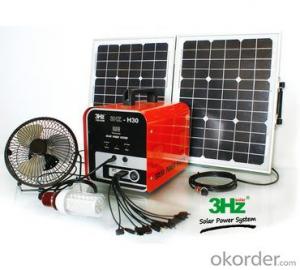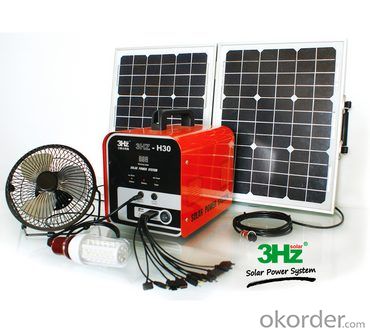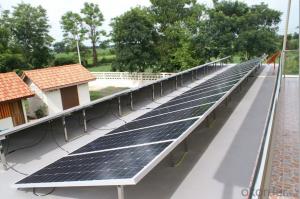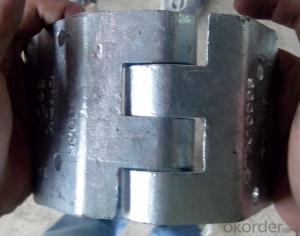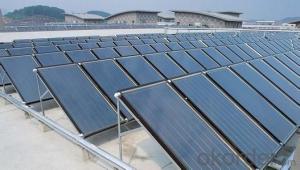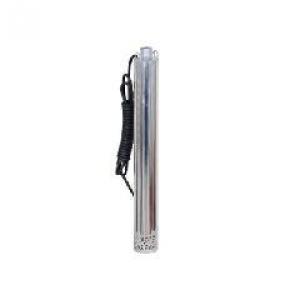Wholesale Solar Power Systems
- Loading Port:
- Guangzhou
- Payment Terms:
- TT OR LC
- Min Order Qty:
- -
- Supply Capability:
- 2000 unit/month
OKorder Service Pledge
OKorder Financial Service
You Might Also Like
Power isn’t always available where and when you need it. Whether you’re hiking in the mountains, camping in the woods, or just plain trying to get away from it all, you need a portable power supply to keep your electronic devices working. Now more than ever, we are dependent on our energy hogging devices to help us live. There’s plenty of free solar power from the sun, so we carry a variety of portable solar power packs to keep you connected. When you need a portable power supply, think of 3HZ-SOLAR!
Our specialty is portable solar power packs, so let us know if you have a special request or question. It’s sometimes hard to know how much power you need for your application. Most of our portable solar power packs require a few extras to charge from the sun, so be sure to check out our complete solar kits. Otherwise, our portable power supply items can be charged from the wall or car. To be truly free, you’ll want to use solar, though.
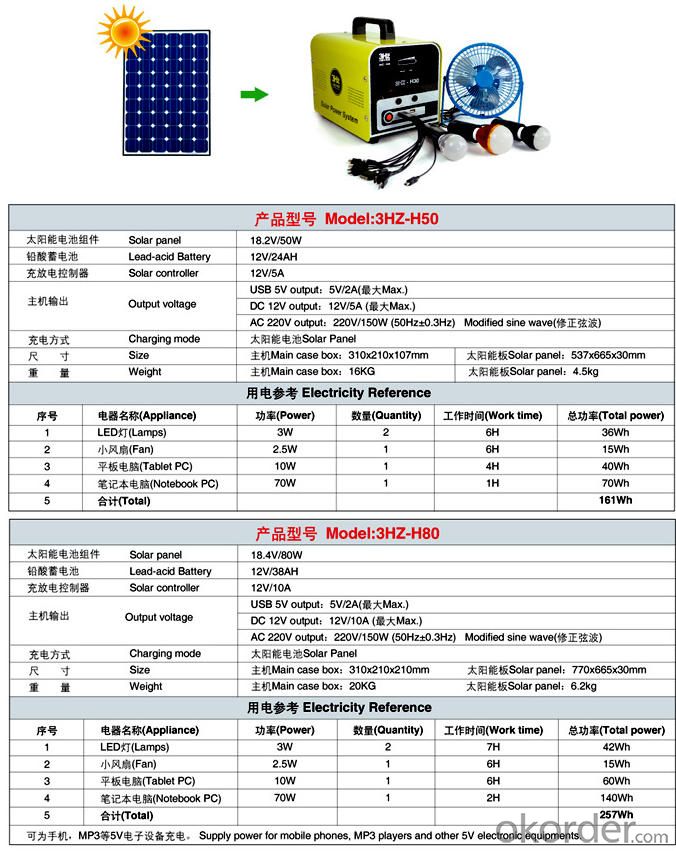
- Q: What maintenance is required for a solar energy system?
- Regular maintenance is necessary to ensure that a solar energy system performs optimally and lasts a long time. This involves inspecting, cleaning, and monitoring various components of the system. Here are some important maintenance tasks for a solar energy system: 1. Conduct regular visual inspections: It is crucial to visually inspect the solar panels, mounts, and other components regularly. Look for any physical damage, such as cracks or loose connections, and address them promptly. 2. Keep the solar panels clean: Dust, dirt, leaves, and other debris can accumulate on the solar panels over time. It is important to clean the panels periodically, especially in areas with low rainfall or high pollution, to maintain their efficiency. Use a soft brush, non-abrasive cloth, or hose to remove debris. 3. Check for shading: Make sure there are no obstructions or objects casting shadows on the solar panels. Even partial shading can significantly impact the system's performance, so trim overhanging branches or remove any other sources of shading. 4. Monitor system performance: Regularly check the system's performance using the monitoring tools provided by the manufacturer or installer. These tools help identify any deviations from expected energy production and can indicate potential issues. 5. Inspect electrical connections: Check all electrical connections, including wiring, junction boxes, inverters, and batteries (if applicable). Look for loose connections, corrosion, or any signs of damage that might affect the system's performance or safety. 6. Maintain the inverter: Inverters convert the DC electricity generated by the solar panels into usable AC electricity. Depending on the type of inverter, periodic inspections, firmware updates, or replacement may be required. Follow the manufacturer's guidelines for proper inverter maintenance. 7. Take care of the batteries (if applicable): If your solar energy system includes battery storage, additional maintenance tasks may be necessary. This could involve checking the battery charge levels, electrolyte levels (for lead-acid batteries), and overall battery health. Follow the manufacturer's recommendations for battery maintenance. 8. Seek professional inspections: It is advisable to have a professional solar installer or technician inspect the system at least once a year. They can conduct a more thorough examination, perform any necessary repairs or replacements, and ensure that the system is operating optimally. By following these maintenance practices, you can maximize the efficiency and lifespan of your solar energy system, ensuring that it continues to generate clean and sustainable energy for years to come.
- Q: What is the difference between solar thermal and solar photovoltaic systems?
- Solar thermal systems use the heat from the sun to generate hot water or steam, which can be used for heating or to produce electricity through a steam turbine. On the other hand, solar photovoltaic systems directly convert sunlight into electricity using semiconducting materials, such as silicon, without the need for heat conversion.
- Q: How does a PV system convert sunlight into electricity?
- A PV (photovoltaic) system converts sunlight into electricity through the use of solar panels. These panels contain photovoltaic cells made of semiconducting materials, such as silicon. When sunlight hits these cells, it excites the electrons, causing them to flow and create an electric current. This direct current (DC) is then converted into alternating current (AC) using an inverter, which can be used to power homes, businesses, or other electrical devices.
- Q: Can solar energy systems be used in areas with high levels of dust?
- Solar energy systems can indeed be utilized in areas abundant with dust. Although the efficiency of solar panels may be compromised by dust, electricity generation from sunlight remains feasible. Consistent cleaning and upkeep of the panels can alleviate the influence of dust on their functionality. Moreover, progress in solar panel technology, including the integration of anti-soiling coatings and self-cleaning mechanisms, has simplified the task of preserving their efficiency in dusty surroundings. However, it is crucial to acknowledge that the efficacy of solar energy systems in dusty regions may fluctuate based on the intensity and nature of the dust at hand.
- Q: Can solar energy systems be used in areas with limited roof access for maintenance?
- Yes, solar energy systems can be used in areas with limited roof access for maintenance. While it is more common to install solar panels on rooftops for optimal sun exposure, there are alternative options available. Ground-mounted solar panels can be installed in areas where roof access is limited, allowing for easier maintenance and cleaning. Additionally, solar panel systems can also be integrated into other structures such as carports or pergolas, providing an alternative to traditional rooftop installations. These alternatives ensure that solar energy systems can be utilized effectively in areas with limited roof access for maintenance.
- Q: Can solar energy systems be used for powering electric car manufacturing plants?
- Yes, solar energy systems can be used for powering electric car manufacturing plants. By installing solar panels, the plants can generate clean and renewable energy to meet their electricity demands, reducing their carbon footprint. This not only helps in reducing the operational costs but also promotes sustainable practices in the manufacturing industry.
- Q: Can solar energy systems generate power at night?
- No, solar energy systems cannot generate power at night because they rely on sunlight to generate electricity.
- Q: Can solar energy systems be used for powering water pumps?
- Yes, solar energy systems can be used to power water pumps. Solar-powered water pumps use photovoltaic panels to convert sunlight into electricity, which can then be used to operate the pump. This makes solar energy an environmentally friendly and cost-effective solution for pumping water in remote areas or off-grid locations.
- Q: Can solar energy systems be used for powering remote communication systems?
- Yes, solar energy systems can be effectively used for powering remote communication systems. Solar panels can convert sunlight into electricity, which can be stored in batteries for use during cloudy periods or at night. This makes solar energy a reliable and sustainable power source for remote communication systems, such as radio towers, weather stations, or even satellites, where traditional power sources may not be easily accessible.
- Q: Can solar energy systems be used in areas with limited access to solar monitoring software?
- Yes, solar energy systems can still be used in areas with limited access to solar monitoring software. While solar monitoring software helps track and optimize the performance of a solar energy system, it is not essential for the system to function. Solar panels can still generate electricity from the sun regardless of whether or not the system is being monitored. However, without access to monitoring software, it may be more challenging to monitor the system's performance, diagnose issues, and maximize its efficiency.
Send your message to us
Wholesale Solar Power Systems
- Loading Port:
- Guangzhou
- Payment Terms:
- TT OR LC
- Min Order Qty:
- -
- Supply Capability:
- 2000 unit/month
OKorder Service Pledge
OKorder Financial Service
Similar products
Hot products
Hot Searches
Related keywords
